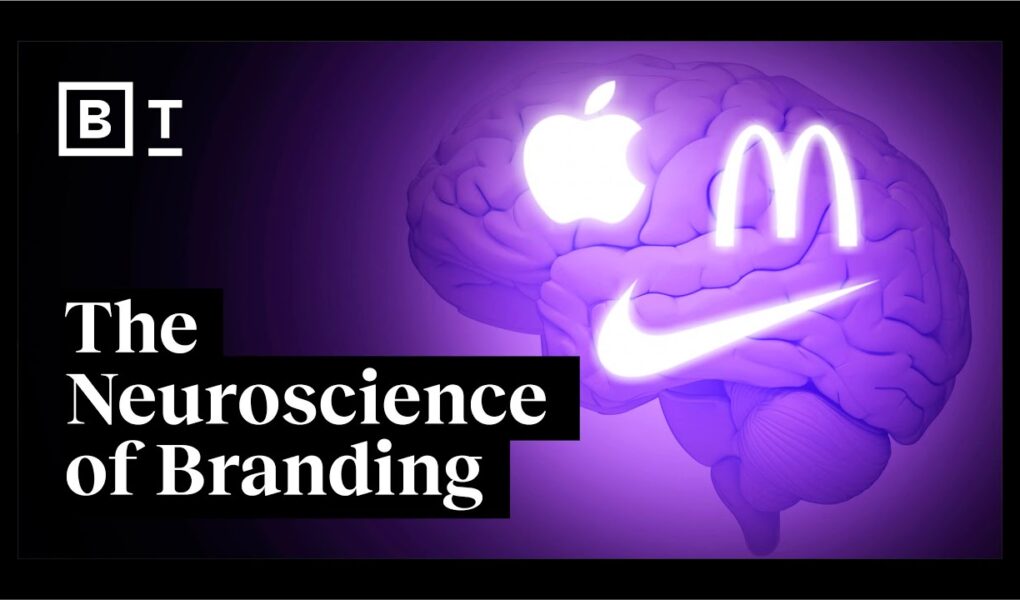Big Think
How Apple and Nike have branded your brain
Watch the newest video from Big Think: https://bigth.ink/NewVideo
Learn skills from the world’s top minds at Big Think Edge: https://bigth.ink/Edge
———————————————————————————-
Powerful branding can not only change how you feel about a company, it can actually change how your brain is wired.
“We love to think of ourselves as rational. That’s not how it works,” says UPenn professor Americus Reed II about our habits (both conscious and subconscious) of paying more for items based primarily on the brand name. Effective marketing causes the consumer to link brands like Apple and Nike with their own identity, and that strong attachment goes deeper than receipts.
Using MRI, professor and neuroscientist Michael Platt and his team were able to see this at play. When reacting to good or bad news about the brand, Samsung users didn’t have positive or negative brain responses, yet they did have “reverse empathy” for bad news about Apple. Meanwhile, Apple users showed a “brain empathy response for Apple that was exactly what you’d see in the way you would respond to somebody in your family.”
———————————————————————————-
TRANSCRIPT:
NARRATOR: Coke is just soda. Tylenol is just acetaminophen. And Levi’s are just jeans. Yet consumers go out of their way to select these specific brands over others.
AMERICUS REED II: An economist would say,”How is this possible, that a rational consumer would be willing to pay more for exactly the same thing?” We love to think about ourselves as rational. That’s not how it works.
A very famous study done by colleagues at Duke University flashed either the Apple logo or the IBM logo to two randomized groups of participants.
NARRATOR: The study found that after being subliminally exposed to the Apple logo, compared to when you’d been exposed to the IBM logo, participants performed better on creative tasks.
AMERICUS REED II: And the argument is that Apple has been telling you this story over and over again, that Apple is the brand for hip, cool, fun, creative people.
NARRATOR: This is the true power of brands. They can influence our behavior in ways that extend way beyond the point of sale. So to what degree can the influence of brands wreak havoc on our ability to make rational spending decisions? This is your brain on money.
This is Americus Reed. He studies identity and marketing at the University of Pennsylvania.
AMERICUS REED II: When I make choices about different brands, I’m choosing to create an identity. When I put that shirt on, when I put those shoes on, those jeans, that hat, someone is going to form an impression about what I’m about. So if I’m choosing Nike over Under Armour, I’m choosing a kind of different way to express affiliation with sport.
The Nike thing is about performance. The Under Armour thing is about the underdog. I have to choose which of these different conceptual pathways is most consistent with where I am in my life.
NARRATOR: And once a consumer makes that choice, their relationship with a brand can deepen to the point where they identify with that brand like family. And once you identify with a brand, it can shape the way you behave.
AMERICUS REED II: And it’s really interesting because they will also, if someone talks bad about that product, brand, or service, they will be the first to go out and defend. Why? Because an attack on the brand is an attack on themselves.
NARRATOR: Michael Platt is a professor of neuroscience, marketing, and psychology whose research demonstrates how our perception of brands influences our decisions.
MICHAEL PLATT: There’s an idea in marketing, which is that we relate to brands in the same way we relate to people. It’s like, “I love this brand,” or, “I hate this brand.” Of course, what people say can often be different from what’s really going on in their heads.
So we thought, “Well, why don’t we just ask the brain directly?”
NARRATOR: Michael and his team observed the brains of iPhone users and Samsung Galaxy users with an MRI machine while they heard good, bad, and neutral news about Apple and Samsung.
MICHAEL PLATT: Apple customers showed a brain empathy response toward Apple that was exactly what you’d see in the way you would respond to somebody in your own family.
NARRATOR: Strangely, Samsung users didn’t have any positive or negative responses when good or bad news was released about their brand. The only evidence that Samsung users showed was reverse empathy for Apple news. Meaning if the Apple headline was negative, their brain reflected a positive response.
MICHAEL PLATT: You know, it really shows us that Apple has completely defined the market here. Samsung customers, it seems, from their brain data, are only buying Samsung…
To read the full transcript, please visit https://bigthink.com/singleton/how-apple-and-nike-have-branded-your-brain
Source




Advertising should be illegal
You're wrong, if it's the same thing but being sold at higher price, the brand will die after a few years
I am working on a business idea, that puts worth back in humans rather than brands. I don't want to spread hate about brands I just want people to know their worth, and fall in love with that. That's my mission.
Thanks for this video. God bless ❤
I blame mirror neurons. Now that I am aware of them , I can choose not to accept their prompting.
The customers decision making has really evolved over time from
Features : What it has -> Benefits : What it does -> Experiences : What You'll feel -> Identification : Who you are 🙂
The violins and other instruments playing in the background totally ruin the experience of watching this video… Why are the violins and other instruments necessary? Why are they as loud as the people speaking in the video?
Its about quality also. You cant built a brand solely on marketing
Adidas lady looks cool.. I like Adidas .. maybe it's because I'm from eastern Europe hahaha
so you heard it here first, all you android users that say " its not that I dont like Apple its just because Andriod is better" are all lying to them selfs and secretly dont like the identity or brand of Apple.
It's true. We are all brands, we all have identities and make decisions based upon our "brand" and people do make opinions about the way you look and act which is why I think more people should take time to understand themselves and their actions that could damage/improve their own brand.
Your background music is so loud and annoying that I couldn't focus on what you say.
Even when subtitles are available.
Brands are modern day religionsz
Always pause,and see your wallet…😅
What's the intro music?
“Do Good” from Anne Bahr Thompson teaches you how to create such a brand
In India mostly middle class market choose brand because they promise better quality over local ,if we find better sale price in Nike we'd be happy to give up Adidas,😂we hardly identify ourselves with the brand but the price and quality
Talvir sir students attendance here 😅😅😅
Are u sure you're not sponsored by Apple?
The overinflated ego over-rides the logical brain. Why continue to pay more for old existing techology? How much new technology is added to a new model of a phone or laptop? The only thing new is often just the esthetic design. Alluring advertisements can play out like a scam – to steal your hard-earned money.
One of the tribe, now…
A 500-year-old synagogue from a brothel in Istanbul, Karaköy, a church is open, a 500-year-old Ottoman slave market can be used and the Palestinian war can be financed, and the land works inherited from the Ottomans are in operation, there are guarantors of this wealth, fb gs, bjk, Istanbul is the Ottoman society, there is hostility towards Ataturk and Ankara, there are parks and gardens, grave works, and heroin can be smoked by foreigners. Those who burned their houses are destroying their opportunities through deceit. Galataport is a 500-year-old slave market, churches and synagogues are trash toilets.🐐🇹🇷✍🏽🀄️
So what your saying is this is a apple commercial disquised as a thought project.
I use samsung but I dont hate apple, I`m just used to samsung and i think they are cheaper as well.
hello
Apple users act as a toxic unpaid Apple Ambassador pushing passive advertising of Apple Brand. Sometimes many become too toxic. Specially, the Narcissistic or Sarcastic Women & Men,- Apple show up continuously asking friends to waste money just like them disrespecting individual preferences pretending to be so privileged because of owning Apple. Disgustingly, high attitude.
Utter bullshit… expected better explaination
i come across this video to practice my listening. can someone tell me what did he said on the 0:24
my opinion:" That's not how ordes" is it true while the transcript wrote down "That's not how it works"
What if i wear Nike and UA?
really insightful
I am doing good in life and realized costco clothing are the best 🤷♂️
Cause they hate apple? Or they can't afford sh-t that's freaking expensive XD and nonesense!
Excellent🍬 🌟💗Keep sharing.Thankyou.
The answer is Oxytocin! The research backs it up.
It’s not always about logo , it’s about performance
Sports goods all are OEM products coming from the same factory in Vietnam (previously China) but differentiated by brand equity. You pay more for Nike as Nike need to pay it's sports ambassador that makes you feel good.
My perception of Apple when i was younger was that it was easier to use and reliable and that it justified the cost for people who could afford it. However I leaned towards regular PCs because money was an issue. When Apple transitioned to phones, they seemed more expensive for no reason. I am vulnerable to other marketing but not enough to have been interested in Apple. I also heard rumors of Apple bloatware and frequent releases of products to avoid it being expensive. It made no sense for me to be interested in Apple products when I could successfully use a PC or Android for less.
I don't think they are the exact same thing. I am against blind following trands and don't shop like this. But I know the difference between quality product and cheap product
Apple is the biggest monopoly in the world.
A great brand represents products or services or experiences of a quality that it consistently strives to live up to – something that the person representing the brand (by wearing or sharing or emulating, etc) admires or wants others to believe they support. For example, what does the United States flag represent? Does the current government across the aisles represent the 'brand' of the US flag? Do the businesses? Do the people? US? Branding is essentially mythos and meaning. What does a symbol mean? We could be talking anywhere, and for or with any of US. Because a flag, like a swoosh…is also a brand symbol. So what, exactly, are we selling? And why? Should we restart class? Ask away…Just Do It!